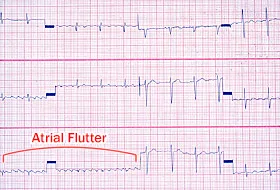Tecasin Afib
Atrial fibrillation (AF or afib) is the most common irregular heartbeat and is characterized by heart palpitations, dizziness, and shortness of breath. This progressive and debilitating disease can lead to stroke, heart failure, and Alzheimer's disease, and can double your risk of death. Afib takes a physical toll, an emotional toll, and a financial toll on those who are living with it—not just the patient, but the family, too.
If you wonder whether you are at risk for atrial fibrillation, or whether you might have it already, or if you want to know how to manage afib now that you have been diagnosed, then you have come to the right place. StopAfib.org is here to help increase your knowledge about afib, to help improve your quality of life if you are living with it, and to help you avoid an afib-related stroke.
How StopAfib.org Can Help You
So let's Get Started Learning About Atrial Fibrillation.
News from StopAfib.org
Here are the most recent atrial fibrillation news stories. Sign up for our Newsletter on this page to be notified of the latest news stories.
See the News and Events page for other news, events, and video interviews with top afib doctors.
Managing Afib During a Pandemic: Answering Your Vaccine Questions
- Wenxin Keli Early research shows the extract of a mixture of five different Chinese herbs may help treat occasional, or paroxysmal, AFib. But some people in those studies had problems when they.
- A quivery heartbeat or flutter in your chest: two telltale signs you could be in atrial fibrillation, or AFib. That means your heart is beating out of sync. As weird or scary as an episode may.
Do you have questions? How to protect yourself. ... more
Our Gift to You: Watch the 2020 Patient Conference Opening Session
A NEW APPROACH TO AFIB. Currently, if you have AFib, your doctor will discuss medications and possible surgical approaches—and, if you’re lucky, mention lifestyle. The new research suggests that the order should be the opposite—the first line of treatment for someone with AFib is to treat the risk factors, including obesity, that led to it. What can I do to prevent (reduce my risk for) atrial fibrillation (AFib)? To reduce your risk for the onset of AFib, maintaining a heart-healthy lifestyle is always your best option. If you have been diagnosed with AFib, take medications if they are prescribed for you, and get proper treatment and management of your condition so you can reduce.
Tykocin Drug
Answers to the Most Common Afib Patient Questions: Our Gift To You ... more
Complimentary: Get Back to Care Webinar Series
To give you vital information to avoid missing out on the care you need during the pandemic ... more
Tekocine Medication
The StopAfib.org Atrial Fibrillation Patient Conference Goes Virtual Oct. 30–Nov. 1
Anyone anywhere in the world can hear directly from the foremost experts in afib ... more
Afib News from the European Society of Cardiology 2020 Congress
New Atrial Fibrillation Science Presented at the ESC Congress 2020: The Digital Experience ... more
Webinar Replay is Now Available: How to Know When It’s Safe to Have an Afib Catheter Ablation

Dr. Suneet Mittal shares how to know if it’s safe to have an atrial fibrillation procedure during and after the COVID-19 pandemic ... more
The Heartline Study is a virtual heart health wellness study for people 65+
Can this study reduce the risk of strokes from atrial fibrillation? ... more
Introducing The StopAfib.org Library Collection of No-Cost Videos for Atrial Fibrillation Patients
Access Invaluable Patient Conference, Webinar, and Master Class Videos ... more
Coronavirus Resources for Those with Afib
Ticacin
Credible information on the coronavirus (COVID-19) ... more
Tykinson
Raising Awareness About Atrial Fibrillation on National TV
Watch the afib awareness segment on the Dr. Phil Show on April 10, 2019 ... more